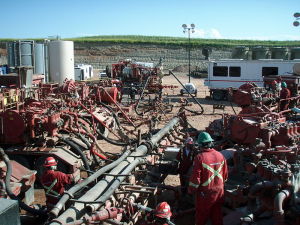Texas Oil Town Makes History as Residents Say No to Fracking
The Texas town where America’s oil and natural gas boom began has voted to ban fracking, in a stunning rebuke to the industry.
Denton, a college town on the edge of the Barnett Shale, voted by 59% to ban fracking inside the city limits, a first for any locality in Texas.

“It should send a signal to industry that if the people in Texas – where fracking was invented – can’t live with it, nobody can,” said Sharon Wilson, the Texas organiser for EarthWorks, who lives in Denton.
An energy group on Wednesday asked for an immediate injunction to keep the ban from being enforced. Tom Phillips, an attorney for the Texas Oil and Gas association, told the Associated Press the courts must “give a prompt and authoritative answer” on whether the ban violates the Texas state constitution.
Athens in Ohio and San Benito and Mendocino counties in California also voted to ban fracking on Tuesday. Similar measures were defeated in Gates Mills, Kent and Youngstown, Ohio, as well as Santa Barbara, California.
Denton remains a solidly Republican town, and oil companies reportedly spent $700,000 to defeat the ban, according to the Denton Record-Chronicle – nearly $6 for every resident.
“It was more like David and Godzilla then David and Goliath,” Wilson said. But she said residents were fed up with the noise and disruption of fracking, and the constant traffic and fumes from wells and trucks operating in residential neighbourhoods.
The town is probably the most heavily fracked in the country.
The industry has drilled wells on church property, school grounds and on the campus of the University of North Texas, right next to the tennis courts and across the road from the sports stadium (and a stand of giant wind turbines).
In Texas, as in much of America, property owners do not always own the “mineral rights” – the rights to underground resources – so typically have limited say over how they are developed.
